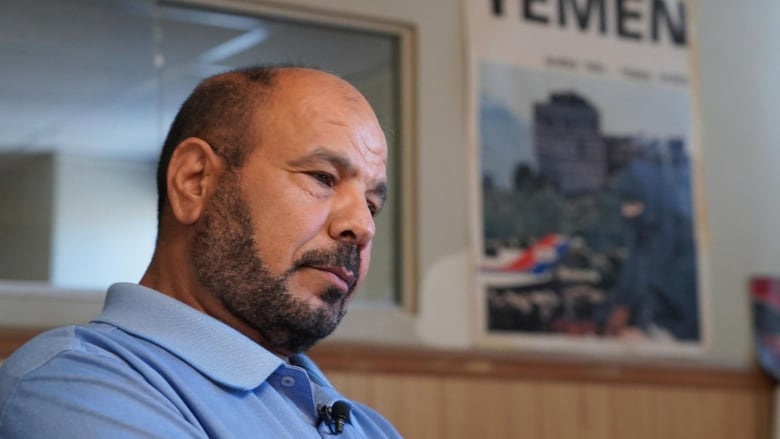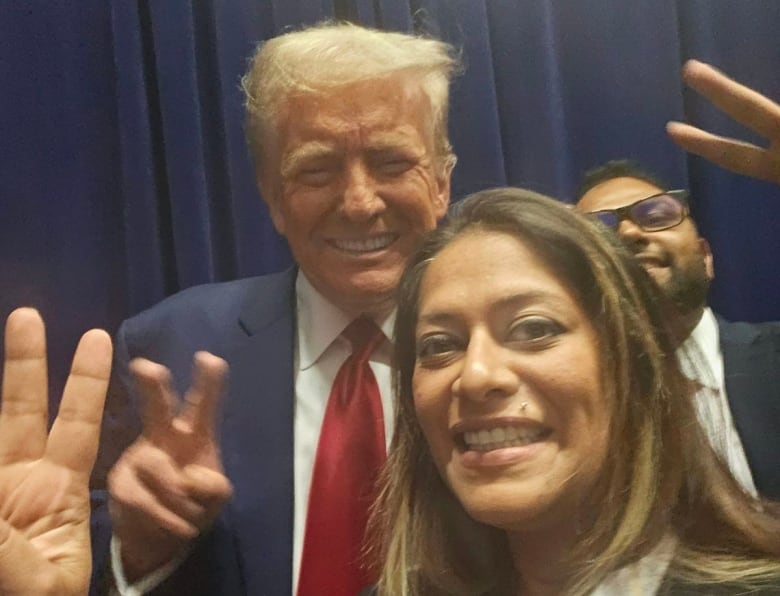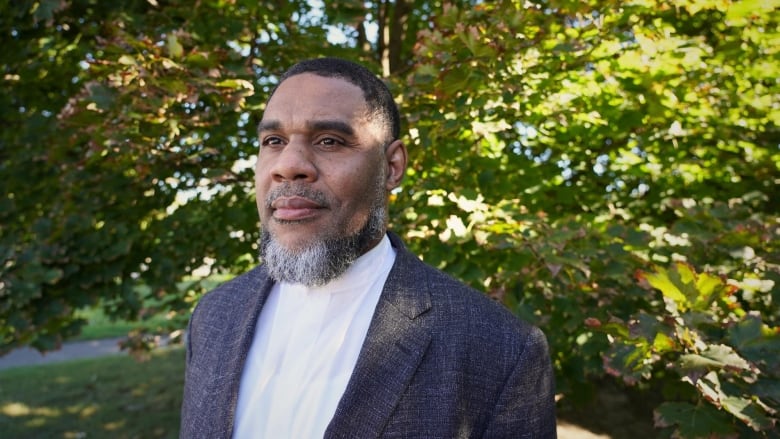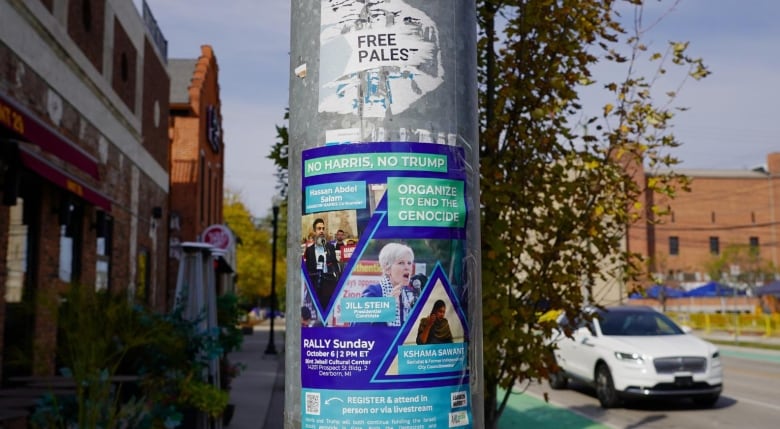
Walid Fidama and Abdulhakem Alsadah have been friends for more than a quarter century. They joke about knowing each other’s children since before they were born. They’re both longtime members of the National Association of Yemeni Americans, socially and politically active in their home state of Michigan.
For months, Fidama didn’t tell Alsadah about his voting plan in the upcoming U.S. presidential election. When Fidama agreed to sit for an interview at the association’s office in Dearborn, Mich., an intrigued Alsadah listened from a rolling office chair in the back of the room.
Fidama, a genial man with eight daughters, confirmed he won’t be voting for a Democratic president this November for the first time since he got his American citizenship in 1994. The party, he says, needs to understand votes from even the most party loyal are not guaranteed — and they’ve lost his ballot this year over the crisis in the Middle East.
“We are Democrats, but the Democrats are not following what humanity needs and for what the people need around the world,” he said.
“If they keep not listening to the right things, which we need and what the people need, they are gonna get hurt.”
From his corner seat, Alsadah nodded.

Voting third-party or not at all
Four years ago, Arab American and Muslim voters helped deliver President Joe Biden to the White House by rallying behind him in Michigan, one of seven critical swing states with power to sway the outcome of the election.
This year, many of those same voters are leaving the Democratic Party behind because they feel betrayed, forgotten and angry over the Biden administration’s handling of the Middle East conflict and the U.S.’s ongoing allyship with Israel.
With this year’s race for Michigan likely to be decided by a thin margin, voter sentiment there could have an outsize impact on determining who becomes the next U.S. president.
“I cannot emphasize my [disgust] with the current administration and their lack of leadership, their lack of empathy toward the Palestinian people, their lack of empathy toward the Lebanese people,” said Alsadah, 62, chair of the Yemeni American Democratic Caucus, who declined to specify how he’ll be voting.
Michigan’s Arab and Muslim voters overwhelmingly backed Joe Biden in the 2020 U.S. presidential election, but some now plan to vote for Donald Trump in protest. CBC’s Kris Reyes toured the key battleground state to see how anger over the Middle East crisis and U.S. military support for Israel is costing the Democrats support when they need it most.
Most of the roughly two dozen voters in Michigan who spoke with CBC News this month said they’d be voting for a third-party candidate, or not at all. Only a handful emphatically said they’d be backing Harris.
The discontent is palpable in Dearborn, the first Arab-American majority city in the United States. In the city, 15 kilometres west of Detroit, it’s not hard to find people with deeply personal and painful connections to losses in the Middle East over the past year.
“I’m so enraged, it’s no longer hurt. It’s rage. I want the Democrats to lose by any means necessary — and that means voting for Trump,” said Dearborn-based political activist Samraa Luqman, who was once “so far left” she wrote in Bernie Sanders’ name in 2020.
The mother of Yemeni-Palestinian children, Luqman said her decision to vote for Trump is rooted in a strategy to keep Harris out of office.

“I never, never would have imagined that I would sit here at any point in time and tell you that I was endorsing Trump for president. Never in my life. So is it difficult? Yeah, it’s been difficult.”
There isn’t high-quality polling on Arab-American and Muslim voters, and the community is not a monolith — voters can identify with a range of racial or religious groups and differ culturally — but census data shows Michigan is home to more than 300,000 people with Arab American or North African ancestry.
Biden took the state back from former president Donald Trump in 2020 by a razor-thin margin of just 154,000 votes — in part because of overwhelming support from Arab American and Muslim voters.
“Biden would not have won Michigan without Muslim votes. For sure. He would have not won without the Muslim community being galvanized, organized and overwhelmingly voting for him,” said Dawud Walid, an executive director with Council on American-Islamic Relations.
Sipping an Adeni chai at Yemeni-owned Shibam coffee shop in nearby Canton, Mich., Walid said he doesn’t think Harris can become president without winning Michigan.

Support thrown behind Greens
Multiple people who were asked about the election in Dearborn said they’d be reluctantly voting for Harris because they see her as the “lesser of two evils.” Others said choosing a candidate felt like being “stuck between a rock and a hard place.”
But some were certain about how they felt.
“The deciding factor behind my vote in November would be the treatment of the genocide of Gaza and as well as what’s going on in Lebanon. So due to that factor, we will be abandoning the Harris campaign,” said Mohammad Younis, 29, noting he plans to vote for a third party.

Most national polls show roughly one per cent of voters are likely to back Green Party candidate Jill Stein, but that number doubles in Michigan — not an insignificant difference in a state won or lost by a few thousand votes.
Harris, 59, launched her candidacy for president after Biden, 81, dropped out of the race in July. She has been endorsed by Emgage Action, which works to educate and mobilize Muslim American voters. The Uncommitted Movement declined to endorse Harris, but cautioned against a third-party vote over the risk it could lead to another Trump presidency.
The national Abandon Harris campaign, formerly Abandon Biden, endorsed Stein this month.
Farah Khan, one of the campaign’s organizers, says she feels complicit in the suffering of Palestinians because she voted for Biden and Harris in 2020.
“[Democrats] take our vote … And once they are elected, they will forget all about it. They turn around and stab us in the back,” said Khan, whose long wooden dining table in metro Detroit was piled with flyers and “Abandon Harris” lawn signs.
“It’s time we stand up for what’s right for our people, for us, for our country.”
Harris’s position on the Middle East
Throughout her time in office and on the campaign trail, Harris has maintained that Israel has a right to defend itself against Hamas and Hezbollah while calling for a ceasefire and using stronger language than Biden to describe the humanitarian suffering Israel has created in Gaza.
Trump, 78, has supported Israel throughout his campaign, blaming the regional crisis on what he has described as weak leadership from Biden and Harris.
Both candidates campaigned in the battleground state on Friday. Harris was in Grand Rapids, the heart of more conservative western Michigan, before heading to Lansing and Oakland County. Trump spoke in Auburn Hills before an evening rally in Detroit.
Polls suggest the U.S. presidential candidates are essentially tied with a little more than two weeks to go before the vote. There were roughly 206,000 registered Muslim voters in Michigan in 2020, according to Emgage. A little more than 71 per cent of those people cast ballots.
Speaking from his office last Friday, Fidama said he thinks Harris will ultimately win the White House in November because her strength on other election issues like reproductive rights will draw out enough favourable voters to make up for the loss of support from Arab Americans.
But he warned that the Democrats should be concerned about so many once-faithful voters leaving the party in droves.
“I don’t think they are doing the right thing for us.”
